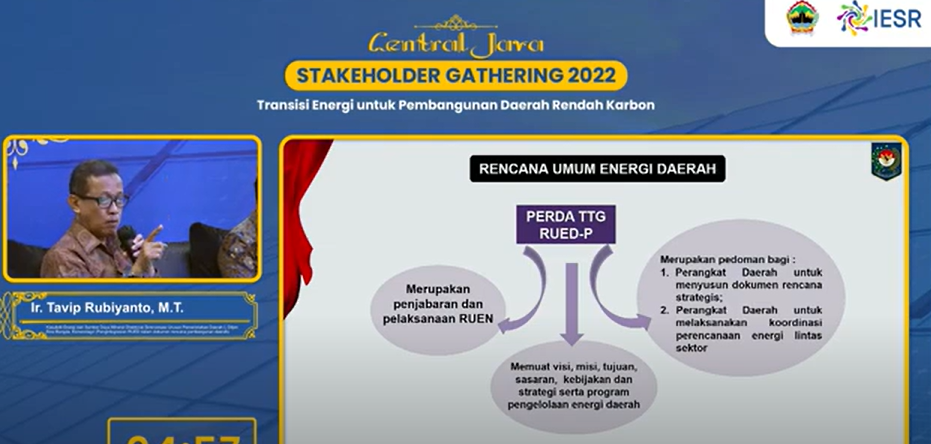Semarang, December 8, 2022 – Indonesia is setting a target to achieve a renewable energy mix of 23% in 2025. In order to encourage the energy transition in Central Java, the Institute for Essential Services Reform (IESR) and the Central Java Provincial Government are holding the Central Java Stakeholder Gathering 2022 with the theme ‘Energy Transition for Development of Low Carbon Areas’ which takes place annually via hybrid.
Achmad Husein, The Regent of Banyumas, stated that he had closed the two most giant landfills in Banyumas to reduce carbon. Garbage will be sorted into useful, non-organic and organic waste.
“In managing waste, Banyumas uses technological solutions divided into two types, first downstream (community), by using a waste bank. Second, an app initiative to reduce plastic waste upstream, by buying all plastic from the community (various types of plastic). Then, there is also an application for people to sort organic waste and get paid. Each kilogram of organic waste is paid Rp. 100, “explained Achmad Husein.
Tavip Rubiyanto, Head of Sub-Division of Energy and Mineral Resources, Directorate of Synchronization of Regional Government Affairs I, Directorate General of Regional Development, Ministry of Home Affairs, explained the importance of regional development, which can make a significant contribution to national development. However, several cities still need to prepare a Regional Energy General Plan (RUED), so assistance from the Central Government is required in its design. The problem is that regions can only contribute as much as the authority they hold.
“Regional authority for energy transition is relatively small, so its contribution is also relatively small. For this reason, the Ministry of Home Affairs will draft a Presidential Decree for Strengthening Regional Roles. Consequently, the regions need to revise the RUED according to the new authority/budget to support the energy transition target,” Tavip explained.
In line with Tavip, Djoko Siswanto, Secretary General of the National Energy Council (DEN) hopes that there will be better coordination and cooperation between local governments in Indonesia to achieve renewable energy goals. For example, the Central Government can instruct local governments to use electric vehicles in implementing RUED. Even so, there are still obstacles in increasing energy utilization in accordance with regional potential, most importantly funding.
“On the other hand, we need international support to face the funding challenges in the energy transition. For this reason, regional regulations can become a basis for investors in developing renewable energy in the region. It could be with the cooperation of region-owned business entities, the private sector, and international parties,” said Djoko.
To support the acceleration of the energy transition in the region, Muhammad Firdaus, Deputy Head of Bank Indonesia Representative for Central Java Province, explained that green financing (green economy) in Central Java is significant o support a sustainable economy. The green economy is projected to deliver benefits such as job creation, and help ease export barriers. Thus the reduction in production costs is only a maximum of 10%, making it less attractive for companies to implement a circular economy.
“Bank Indonesia is trying to encourage banks to extend credit to the green economy sector. One of the projects that has been carried out is Green Loan to Value Ratio (LTV) 0% (without down payment) and allows buying green bonds to meet the Macroprudential Inclusive Financing Ratio (RPIM),” he said.
Meanwhile, Ignasius Iswanto, General Manager Engineering, PT Djarum OASIS Kretek Factory stated that Djarum had made efforts towards sustainability. For example, Djarum already has a carbon footprint report, water resources management, energy saving, and composting. Furthermore, PT Djarum uses a biomass boiler with wood chip fuel on boilers. Emissions reduced from planting rain trees (trembesi) in the Djarum Bakti Lingkungan Program amount to 4,457,400 million tonnes of CO2e. He also explained that through his efforts to make Djarum an environmentally friendly company, he discovered another energy producing source using wastewater, namely plasma energy.
“Plasma energy should also be considered as a source of renewable energy, where liquid waste can be broken down by plasma into electricity and clean water. However, its use is more suitable for industrial complexes,” said Ignasius.

